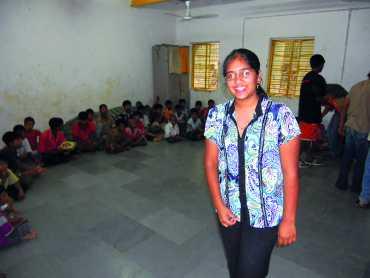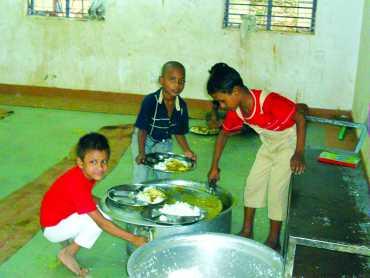Photographs: Pankhuri Jha Pankhuri Jha
Pankhuri Jha, who has just started tenth grade at Hightstown, New Jersey, writes about her journey this year to India and her experience of working with street children in Delhi.
My heart was pounding as our plane landed at the Indira Gandhi International Airport, New Delhi, August 2 at 10 pm.
I grabbed my backpack from the overhead cabin and ran towards the exit as fast I could. I heard my dad call me but I did not stop until I felt a little hand tugging at my shirt, asking me to slow down. It was my little sister Roma, who had caught up with me along with my parents.
Once the door of the aircraft opened and we were allowed to leave, I dashed past everyone and smiled.
I was ecstatic!
After two years, I was finally back to my absolute favourite place in the whole world not only for vacation, but because I had a mission. A mission that I had been planning for a few months now and had really been looking forward to.
The airport looked brand new and stunning! After going through immigration and collecting our luggage, I met my grandparents outside the airport and exchanged hugs and kisses. My grandparents took us to their home in New Delhi.
During the forty-five minutes car ride, I noticed how things had changed in Delhi since my last visit. Broader and busier roads, huge malls, multiple flyovers and stores, and less pollution were some of the changes that I picked up on.
As soon as we reached home, my grandmother, as always, forced us to eat a delicious, multiple-course meal she had prepared. We started chit-chatting and I was wide awake. But I knew that I had to get some sleep so that I could begin my work with the street children in New Delhi the next morning.
I woke up to my mom's voice. It was 7 am already! My grandmother told me that the driver would be there in a few minutes and asked me to get ready quickly.
For the next three weeks, I would be volunteering at a homeless shelter in New Delhi. I was very excited that Anwar Haque, the programme director for the Dil Se Campaign, which is the volunteer organisation where I was supposed to work, had given me this opportunity and was very eager to see how I could contribute.
That morning, my mother and I went to the shelter. It is called Ummeed Aman Ghar, and is located opposite the world famous Qutab Minar in New Delhi, roughly an hour and half away from my grandparents' house. I was supposed to meet the programme director and get started.
When we reached there, I was overwhelmed by the sight of it. I saw a large, single storey, red brick building, with multiple rooms. There were boys of all ages running and playing in the muddy courtyard, barefoot and laughing. Most of the kids were dressed in old shirts and pants covered with dirt and it looked like they had not showered in days.
The ground was muddy and dirty, and I could see and feel swarming mosquitoes, fleas, and flies. I sensed that these living conditions were not ideal for humans and immediately wanted to do everything in my power for the kids.
A little more water in the ocean
Image: Street children eating food at Ummeed Aman GharThe programme director gave us a tour of the shelter, and told us the fundamentals of how things worked there. I learned that this was an all-boys shelter that had 115 children, between the ages of six and 17 years.
Children who lived on the streets and were most vulnerable to begging, drugs and abuse, with little hope and guidance to lead a better life, were brought here almost every day. The shelter then became their new home where they were provided with food, shelter, education and love.
The programme director asked me to teach English and mathematics to the kids. When he introduced us to the boys, they were thrilled to learn that we had come from America. They told me that they wanted to learn basic grammar and "modern English," as one of the older boys put it. Most of them were very enthusiastic and ambitious, asking us questions and treating me as if I were a real teacher.
I spoke to them as best as I could in Hindi and it was an immense experience. The children were upset to see me leave that day and wanted me to come back. I felt elated and much fulfilled.
For the next two weeks, I visited the shelter everyday, taught the kids mathematics and English, and talked to them about life experiences.
It was amazing for me to see how much these kids had experienced in so short a lifetime. I could tell at the end of two weeks that the kids really learned and enjoyed the classes. We surprised the kids by giving them Oxford dictionaries for their little library. We also provided snacks for them and that was so much fun!
In the third week, however, we went to a health clinic near Jama Masjid in New Delhi. Mr Haque explained to me that this was a free clinic, located in the middle of the slums and was meant for the homeless. When we first entered the clinic, we saw a crowd of patients waiting in the hallway to see the doctor.
A man at the front desk showed us around and told us how the clinic worked. I realised that though the clinic had very meagre resources, workers there tried to provide free medications to the homeless. I also went with the social workers and the activists to what they referred to as the "field".
I talked to many homeless people there and tried to learn and understand their needs.
I learnt from the social activists later that "field" referred to places where the homeless stay during the day and sleep during the night.
On my last day of volunteering there, I went once again to Ummeed Aman Ghar to say goodbye to the kids. I told them I was leaving for the US the next day. They were sad on hearing that and so was I. I promised to be back next year.
I am not certain how much difference I made in the kids' lives, but they certainly have changed mine. I think I am beginning to look at things differently. I hope to remain connected to this organisation which does so much for those who have nothing to call their own.
It is incredible how people in India and do so much with such little resources! For the children at Ummeed Aman Ghar, I hope to create an English syllabus that will help them learn the language.
The health clinic could use help in multiple ways. I want to find out how I can provide them with medicines.
I have yet to figure out how I can make my colleagues aware of this organisation called Dil Se Campaign so that they can contribute in their own way. I know my contribution may be just a drop in an ocean, but so be it because without that drop the ocean would have that much less water.



Comment
article